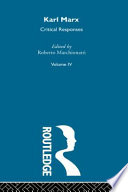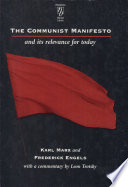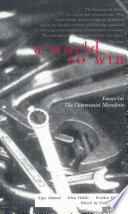 The proletariat will use its political supremacy, to wrest, by degrees, all capital from the bourgeoisie, to centralize all instruments of production in the hands of the State, ie, of the proletariat organized as the ruling class; and to increase the... The proletariat will use its political supremacy, to wrest, by degrees, all capital from the bourgeoisie, to centralize all instruments of production in the hands of the State, ie, of the proletariat organized as the ruling class; and to increase the...  Karl Marx: His Life and Work - Page 118by John Spargo - 1912 - 359 pagesFull view Karl Marx: His Life and Work - Page 118by John Spargo - 1912 - 359 pagesFull view - About this book
 | 1926 - 444 pages
...supremacy in order gradually to wrest the whole of capital from the capitalist class, to centralise all the instruments of production in the hands of the State, ie, of the proletariat organised as the ruling class and to increase as quickly as possible the total of productive forces."... | |
 | Roberto Marchionatti - 1998 - 320 pages
...example, the dictatorship of the proletariat and its role in the social revolution. The proletariat will use its political supremacy to wrest, by degrees, all capital from the bourgeoisie, to centralise all instruments of production in the hands of the State, ie of the proletariat organized... | |
 | Karl Marx, Friedrich Engels - 1998 - 80 pages
...raise the proletariat to the position of ruling class, to win the battle of democracy. The proletariat will use its political supremacy to wrest, by degrees, all capital from the bourgeoisie, to centralise all instruments of production in the hands of the State, ie , of the proletariat organised... | |
 | Silvestra Mariniello, Paul A. Bové - 1998 - 444 pages
...raise the proletariat to the position of ruling class, to win the battle of democracy. The proletariat will use its political supremacy to wrest, by degrees, all capital from the bourgeoisie" (MCP, 490, my emphasis). It is only in polemical texts written after the violence of 1848 that Marx... | |
 | Prakash Karat - 2011 - 159 pages
...raise the proletariat to the position of ruling class, to win the battle of democracy. The proletariat will use its political supremacy to wrest, by degrees,...total of productive forces as rapidly as possible. Of course, in the beginning, this cannot be effected except by means of despotic inroads on the rights... | |
 | Martin Malia - 1999 - 534 pages
...to seize political power in order to "wrest, by degrees, all capital from the bourgeoisie," and then to "centralize all instruments of production in the...of the proletariat organized as the ruling class." All production, moreover, would be "concentrated in the hands of the vast association of the whole... | |
 | Leon Trotsky - 1999 - 110 pages
...position of ruling class, to win the battle of democracy". They went on to explain that the working class "will use its political supremacy to wrest, by degrees, all capital from the bourgeoisie, to centralise all instruments of production in the hands of the State, ie, of the proletariat organised... | |
 | Doug Lorimer - 1999 - 220 pages
...purpose had already been foreshadowed by Marx and Engels in the Communist Manifesto: The proletariat will use its political supremacy to wrest, by degrees, all capital from the bourgeoisie, to centralise all instruments of production in the hands of the State, ie, of the proletariat organised... | |
 | Geoffrey Martin Hodgson - 1999 - 364 pages
...in neglecting the importance of economic variety and pluralism. In their repeated calls for efforts 'to centralize all instruments of production in the hands of the state' they denied the enduring value of decentralisation, markets and a mixed economy. In this manner, the... | |
| |